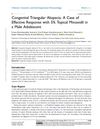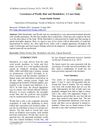
COVID-19 can cause significant hair loss.

Good nutrition may help prevent premature hair graying.
 July 2024 in “Plastic and Aesthetic Research”
July 2024 in “Plastic and Aesthetic Research” Careful planning and accurate diagnosis are crucial for successful hair restoration surgery.
 May 2024 in “Clinical, cosmetic and investigational dermatology”
May 2024 in “Clinical, cosmetic and investigational dermatology” 5% topical minoxidil effectively treated a boy's congenital triangular alopecia without side effects.
 April 2024 in “bioRxiv (Cold Spring Harbor Laboratory)”
April 2024 in “bioRxiv (Cold Spring Harbor Laboratory)” GRK2 is essential for healthy hair follicle function, and its absence can lead to hair loss and cysts.
 March 2024 in “International journal of pharmaceutical sciences and drug research”
March 2024 in “International journal of pharmaceutical sciences and drug research” Androgenetic alopecia is influenced by various factors and can be treated with medications, procedures, and non-drug methods.
 March 2024 in “Biomedical reports”
March 2024 in “Biomedical reports” Isoflavone may help manage PCOS symptoms, but its effectiveness is uncertain.
 March 2024 in “Frontiers in endocrinology”
March 2024 in “Frontiers in endocrinology” A new MTX2 gene mutation caused a severe genetic disorder in a young Chinese girl.
 February 2024 in “International journal of health, medicine and nursing practice”
February 2024 in “International journal of health, medicine and nursing practice” Raising awareness about PCOS can improve women's quality of life.
 February 2024 in “Journal of Health Science and Medical Therapy”
February 2024 in “Journal of Health Science and Medical Therapy” ADAM17 could be a potential target for treating PCOS.
 January 2024 in “bioRxiv (Cold Spring Harbor Laboratory)”
January 2024 in “bioRxiv (Cold Spring Harbor Laboratory)” The gene Ascl4 is not necessary for the development of hair, teeth, or mammary glands.
 January 2024 in “Epidemiology international journal”
January 2024 in “Epidemiology international journal” 19.7% of Afro-Caribbean women in Tobago have PCOS.
 December 2023 in “Migration letters”
December 2023 in “Migration letters” Herbal treatments can help manage PCOS symptoms.
 October 2023 in “The Egyptian Journal of Hospital Medicine ”
October 2023 in “The Egyptian Journal of Hospital Medicine ” PSA might help diagnose PCOS and related skin issues, but more research is needed.
 September 2023 in “International Journal For Multidisciplinary Research”
September 2023 in “International Journal For Multidisciplinary Research” Ayurvedic treatments can help manage PCOS symptoms.
 September 2023 in “International journal of science and healthcare research”
September 2023 in “International journal of science and healthcare research” Genetic testing is crucial for diagnosing congenital atrichia, a rare condition causing irreversible hair loss.
 September 2023 in “bioRxiv (Cold Spring Harbor Laboratory)”
September 2023 in “bioRxiv (Cold Spring Harbor Laboratory)” Freezing gamma-irradiated amniotic fluid may help hair growth and speed up the growth phase.
 September 2023 in “IP Journal of Nutrition, Metabolism and Health Science/IP Journal of Nutrition Metabolism and Health Science”
September 2023 in “IP Journal of Nutrition, Metabolism and Health Science/IP Journal of Nutrition Metabolism and Health Science” Recognizing and managing hirsutism, alopecia, and acne is crucial for improving wellbeing in women with PCOS.
 September 2023 in “Deleted Journal”
September 2023 in “Deleted Journal” Lifestyle changes improve reproductive function and hormonal balance in obese women with PCOS.
 January 2023 in “European endocrinology”
January 2023 in “European endocrinology” People with alopecia have a higher risk of thyroid cancer.
 July 2022 in “Research Square (Research Square)”
July 2022 in “Research Square (Research Square)” Certain miRNAs may play a role in sheep hair follicle development, which could help improve wool production.

Early identification of lupus through skin signs and blood tests is crucial in India.
 January 2022 in “Eduvest”
January 2022 in “Eduvest” A teenage girl with a fungal scalp infection got better with antifungal and allergy medication, plus medicated shampoo.
 October 2021 in “The Egyptian Journal of Hospital Medicine ”
October 2021 in “The Egyptian Journal of Hospital Medicine ” Combination therapies work better than single treatments for atrophic acne scars.
 September 2021 in “Mağallaẗ al-Muẖtar li-l-ʿulūm”
September 2021 in “Mağallaẗ al-Muẖtar li-l-ʿulūm” Two sisters have rare hair disorders causing short, fragile, kinky hair.
 September 2021 in “International journal of Ayurveda and pharma research”
September 2021 in “International journal of Ayurveda and pharma research” Ayurvedic treatment improved hypothyroidism in a 30-year-old man.

People with Down syndrome have a higher risk of skin disorders and need better screening and treatment.
 April 2021 in “Sohag Medical Journal”
April 2021 in “Sohag Medical Journal” Alopecia areata is an autoimmune condition causing hair loss, linked to genetic factors and immune system issues, with no cure yet.
 May 2020 in “bioRxiv (Cold Spring Harbor Laboratory)”
May 2020 in “bioRxiv (Cold Spring Harbor Laboratory)” The study found that certain genes are important for hedgehog skin appendage development and immunity, with spines possibly evolving for protection and infection resistance.
 April 2020 in “IP Indian journal of clinical and experimental dermatology”
April 2020 in “IP Indian journal of clinical and experimental dermatology” Many children with alopecia areata also have other autoimmune diseases.






























